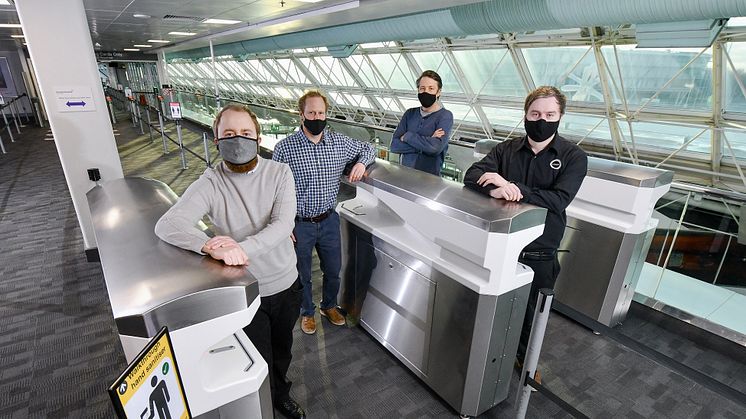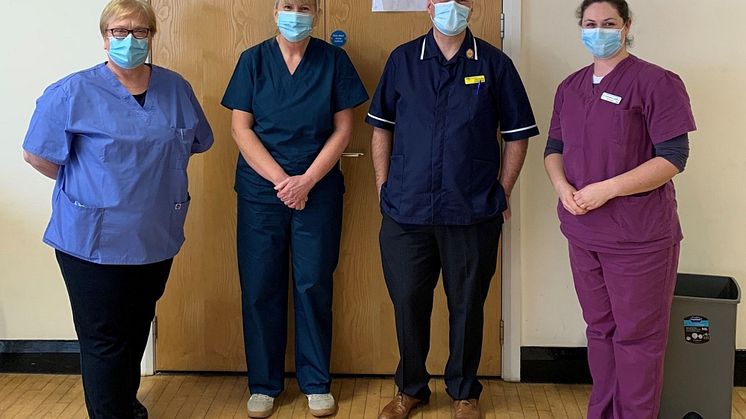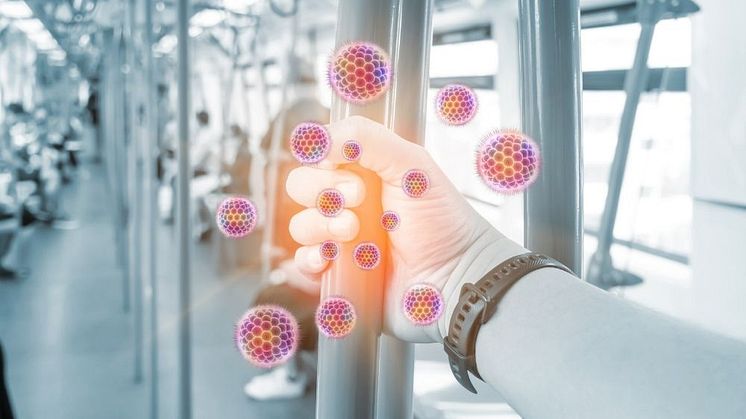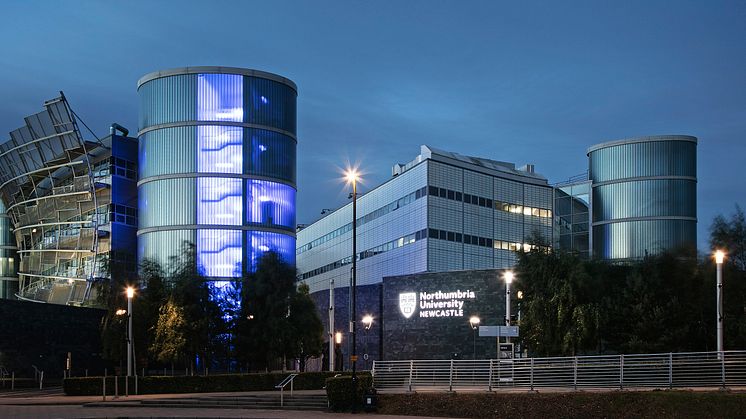
Press release -
Hands on approach to tackling Covid-19 with new sanitisation device
A North East collaboration between a young entrepreneur, a university and an engineering company has led to the development of a revolutionary new hand sanitisation device which could help slow the global spread of diseases such as Covid-19.
The FLO-SAN unit allows people to sanitise their hands on the go, releasing a fine mist which coats users’ hands as they walk past, making it perfect for high footfall locations such as train stations and airports.
The system has been trialled this week at Newcastle Airport and, if successful, could soon be in use in public transport hubs, offices, hospitals, schools and other busy locations all over the world.
Start-up company FLO-SAN Limited was established by chemical engineer and entrepreneur Kieran Dougan, who has collaborated with academics from Northumbria University’s School of Design, and engineering company British Engines to produce the FLO-SAN sanitiser unit.
Together they have been awarded funding of over £280,000 to develop their product through Innovate UK’s Sustainable Innovation Fund – designed to support projects which will help the UK rebuild after the effects of COVID-19.
The idea for FLO-SAN came about after research carried out by Kieran showed that less than 1% of people moving through railway stations were using the ‘stop-and-dispense’ hand sanitiser units.
As he explains: “It was clear to me that in a location as busy as a train station, people just don’t have the time to stop and queue to use the normal hand sanitiser dispensers.
“What is needed for the long term is a system which allows people to sanitise their hands as they move through the station, with even greater ease and speed than passing through a ticket barrier system.
“That is what FLO-SAN aims to achieve – it is designed to sanitise hands without stopping, even if carrying a bag or phone.”
Having come up with the concept for FLO-SAN, Kieran turned to two well-known North East institutions to help him develop the product further.
Northumbria University’s School of Design has an international reputation for creativity and innovation, with iPhone designer Sir Jony Ive and Trunki designer Rob Law MBE among its global alumni.
Senior Lecturer in Industrial Design Simon Scott-Harden and his team helped develop Kieran’s initial idea, ensuring the FLO-SAN was designed with the user in mind and achieving the product’s aim of keeping people moving while effectively sanitising their hands.
He explained: “The design and development of the pilot production model utilised the world leading expertise and cutting-edge facilities that can be found at the Northumbria University School of Design.
“Our team used their experience and expertise to help refine the final design, through the rigorous detailing of the overall aesthetic and user interaction of the final solution, and this could have only been achieved by working closely with FLO-SAN Limited and British Engines.
“The collaboration of three leading North East institutions has been inspiring and a pleasure to be involved in, by working as a close-knit team, we been able to shorten the product development time down drastically, taking Kieran’s initial concept through all the design phases into a pilot production model in only three months.
British Engines group are internationally renowned for providing innovative, expert engineering solutions to clients across the globe. Their production expertise has been used to bring the design to life, producing a prototype and testing it before manufacturing the units which are now being trialled at Newcastle Airport.
FLO-SAN uses sensors to detect people’s hands as they move them through the unit, dispensing a water-based sanitiser as a finely atomised mist which dries quickly and without leaving any sticky residue.
It uses less than 1ml of sanitiser per person, compared with between 2ml and 6ml for many conventional dispensers, making it more environmentally sustainable.
Each unit is capable of holding between 40 and 80 litres of sanitiser – at the maximum capacity this is enough for 80,000 individual doses, compared with between 150 and 500 from a conventional unit, meaning a significant reduction in plastic waste.
Kieran said: “Sanitising hands is key to stopping the spread of diseases such as Covid-19. A study by MIT found that if the percentage of clean hands in key airports increased from 20% to 60%, the rate of disease transmission would fall by 69%.
“It is such a simple thing but can have a huge impact. However, we need to find a way to achieve greater take-up from the public and we believe FLO-SAN could be the answer.
“Even with the promising developments around the Covid-19 vaccine, this pandemic has shown the importance of investing now to make sure our key infrastructure is better prepared to manage and mitigate the risks of any future pandemic.
“Hand hygiene will always be a critical tool in managing transmission risk. Should another pandemic occur, the country needs to be better prepared. It is a simple investment decision as the costs of deploying systems like FLO-SAN is a drop in the ocean compared to the costs of failing to manage the spread.
“Our aim was for FLO-SAN to be able to process people at the same rate or faster than a conventional ticket barrier, that’s around 32 people per minute. We have exceeded that target.
“We’re very pleased to be working with Newcastle Airport on our pilot project. As passenger volumes start to recover, we hope FLO-SAN will be a positive step towards restoring normality and allow passengers all over the world to travel with confidence.”
James Boag, Director of Operations at Newcastle Airport added: “We are pleased be able to support a local entrepreneur and provide FLO-SAN the opportunity to trial this new hand sanitiser device at the Airport.
“The hand sanitising system is designed for high traffic flow areas as seen in airports or similar passenger hubs. The trial will enable FLO-SAN to monitor passenger interactions and provide invaluable insight to support the development of the product. We wish FLO-SAN every success in the future with their design.”
The FLO-SAN team will spend the next three months finalising development of the product, thanks to investment from the Innovate UK Sustainable Innovation Fund.
Innovate UK Executive Chair Dr Ian Campbell said: “In these difficult times we have seen the best of British business innovation. The pandemic is not just a health emergency but one that impacts society and the economy.
“FLO-SAN Ltd, along with every initiative Innovate UK has supported through this fund, is an important step forward in driving sustainable economic development. Each one is also helping to realise the ambitions of hard-working people.”
Topics
Categories
Northumbria is a research-rich, business-focused, professional university with a global reputation for academic excellence. Find out more about us at www.northumbria.ac.uk --- Please contact our Media and Communications team at media.communications@northumbria.ac.uk with any media enquiries or interview requests ---












